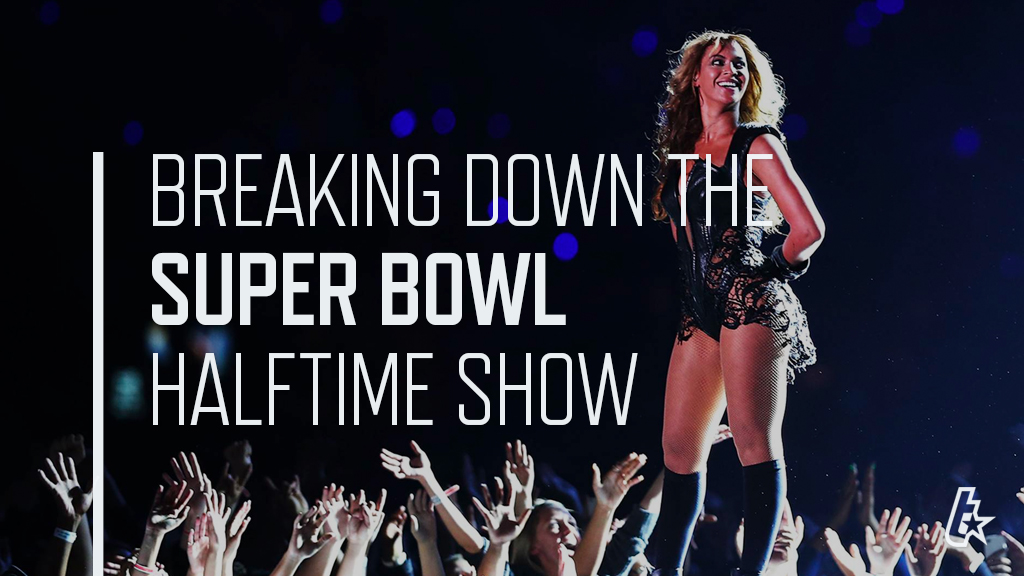Super Bowl Sunday…when over 100,000 attendees & 100 million TV viewers watch the NFL’s best play their championship game. And when intermission happens, it won’t be time for people to grab snacks or head to the bathroom – instead, they’ll be joined by an additional 3 to 4 million TV viewers for the star-laden spectacle of the Super Bowl Half-Time Show, the most-viewed 20 minutes of American network TV each year.
From Marching Bands to Super Stars
When the Super Bowl’s half-time first started, it was a small event designed to showcase local talent and family values – college marching bands, drill teams and the occasional magician shaped the first two decades of performances. It wasn’t until the early 1990s, when competing channels became increasingly clever at stealing away second-half viewers during the half-time show, that Super Bowl upped its half-time show game to keep viewers tuned in.
In 1993, the Super Bowl Half-Time Show first became ‘required viewing’ when Michael Jackson performed, resulting in more watchers during half-time than the game itself. Since then, top music acts ranging from the Rolling Stones to Beyonce have graced the stage, with both Madonna & Beyonce’s recent half-time shows boasting several million extra viewers than the game.
Thanks to these numbers, the Half-Time Show annually secures massive sponsorship deals and top acts, trading exposure to 100 million viewers for the sponsor’s money and free superstar performers. While local sports teams can’t boast these types of numbers, there’s definitely a lot of take-aways from the Super Bowl that can be applied to your own half-time shows.
Get Sponsors
Think like Super Bowl and look for sponsors to help fund creative half-time shows. Offering sponsorship of your half-time show to local companies or current sponsors is a great opportunity for them to get extra local exposure and stand out from other game-day advertisers.
Incorporate Locals and Fans
Super Bowl’s half-time show has been doing this since its early days when local marching bands performed, and most recently in 2012 when it created a game-day choir of over 200 Indianapolis residents. It’s a great strategy on a smaller scale for building a greater sense of community between a team and its fans and home city. Booking local bands, selecting fans for opportunities to be on stage with acts, or holding fan-participation competitions during half time are all options for building rapport with your fans.
Quality Performers
It always pays off to bring in the best quality performers you can afford. As the Super Bowl Half Time show has proven, having a great half-time act can make the half-time show more appealing than the game itself, especially for those who usually aren’t interested in sports events. Offering quality entertainment during half-time increases your chances of selling tickets to non-fans, offers a great reason to stick around for the second half when a game is going badly, and rewards ticket holders with a great half-time show for their loyalty to the team.
Bring in an Event Production Team
The Super Bowl half-time show would be a disorganized, chaotic mess if there wasn’t a production team overseeing every element of it. Each year one or more production companies or event management firms takes charge, coordinating and booking performers, organizing lighting, sound, and stage design, running rehearsals, and handling all elements of pre and post production. It’s a job that requires a huge amount of resources, entertainment industry connection, and hundreds of man-hours to create the incredible (and usually incredibly smooth) spectacle the audience experiences.
For local sports teams, it’s a strategy that’s worth adopting. Working with an events management firm on your own half-time shows is an investment that easily pays for itself, especially if you’re looking to turn all your half-time shows into something special. A well-established events production company has the experience and entertainment industry connections to book performers, hire equipment and present streamlined shows for a fraction of the time and money it costs to organize them on your own.


